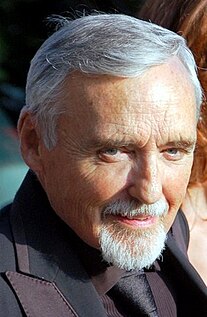
Dennis Lee Hopper was an American actor and filmmaker. He attended the Actors Studio, made his first television appearance in 1954, and soon after appeared alongside James Dean in Rebel Without a Cause (1955), and Giant (1956). In the next ten years he made a name in television, and by the end of the 1960s had appeared in several films, notably Cool Hand Luke (1967) and Hang 'Em High (1968). Hopper also began a prolific and acclaimed photography career in the 1960s.

Easy Rider is a 1969 American independent road drama film written by Peter Fonda, Dennis Hopper, and Terry Southern, produced by Fonda, and directed by Hopper. Fonda and Hopper play two bikers who travel through the American Southwest and South, carrying the proceeds from a cocaine deal. The success of Easy Rider helped spark the New Hollywood era of filmmaking during the early 1970s.

Julian David Cope is an English musician, author, antiquarian, musicologist, poet and cultural commentator. Originally coming to prominence in 1978 as the singer and songwriter in Liverpool post-punk band the Teardrop Explodes, he has followed a solo career since 1983 and worked on musical side projects such as Queen Elizabeth, Brain Donor and Black Sheep.

Peggy Suicide is the seventh album by Julian Cope. It is generally seen as the beginning of Cope's trademark sound and approach, and as a turning-point for Cope as a maturing artist.

World Shut Your Mouth is the debut solo album by Julian Cope.
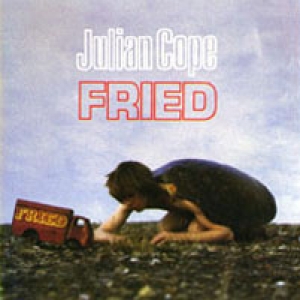
Fried is the second solo album by Julian Cope.

Saint Julian is the third solo album by Julian Cope. It has a very strong pop sound, compared to other Cope releases, and spawned several of his best known tracks.
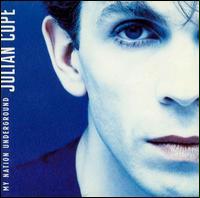
My Nation Underground is the fourth solo album by Julian Cope. It produced three singles including "Charlotte Anne".

Skellington is the fifth solo album by Julian Cope, released in November 1989 as a semi-official bootleg for fan club members only. Originally released on Cope's own CopeCo label, it was later reissued in March 1990 through Zippo Records.

Jehovahkill is the eighth album by Julian Cope, released in 1992. After the critical success of Peggy Suicide (1991), Cope's idea for Jehovakill was to incorporate a krautrock attitude into his music. He began recording the album with musicians Rooster Cosby and Donald Ross Skinner, while co-producing it with the latter. The sessions yielded what Cope considered to be his most sonically experimental material to date. Originally titleing the record Julian H. Cope, he sent an eleven track version to Island Records, who initially rejected its release, but gave Cope extra recording sessions for the album. During the extra sessions, in which six extra songs were recorded, the album became harder and was retitled Jehovahkill.
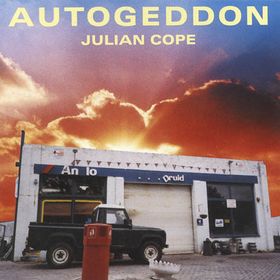
Autogeddon is the eleventh solo album by Julian Cope, released in 1994 via The Echo Label. According to the album's sleeve notes, written by Cope, it was "inspired by Heathcote Williams' epic poem of the same name and a little incident concerning my pregnant wife and £375,000 of yellow Ferrari in St. Martin's Lane, London, England."

"World Shut Your Mouth" is a song by the English singer-songwriter Julian Cope. It is the first single released in support of his third album Saint Julian. The title of the song is the same as Cope's first solo album, World Shut Your Mouth.
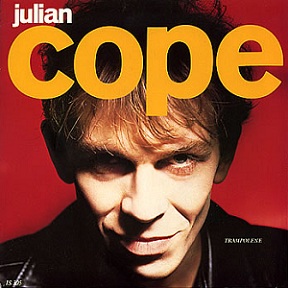
"Trampolene" is a song by the English singer-songwriter Julian Cope. It is the second single released in support of his third album Saint Julian.

"Eve's Volcano " is a song by the English singer-songwriter Julian Cope. It is the third and final single released in support of his album Saint Julian.
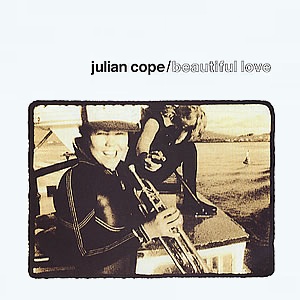
"Beautiful Love" is a song by the English singer-songwriter Julian Cope. It is the first single released in support of his 1991 album Peggy Suicide. The Beautiful Love e.p. includes four tracks - see sidebar.

"Head" is a song by the English singer-songwriter Julian Cope. It is the third and final single released in support of his album Peggy Suicide.

"Fear Loves This Place" is a song by the English singer-songwriter Julian Cope. It is the only single released in support of his album Jehovahkill.

"Try Try Try" is a song by the English singer-songwriter Julian Cope. It is the only single released in support of his album 20 Mothers.

"Planetary Sit-In" is a song by the English singer-songwriter Julian Cope. It is the second single released in support of his album Interpreter.

Clifford A. "Sonny" Vaughs was an American civil rights activist, filmmaker, and motorcycle builder. Vaughs designed the two chopper motorcycles used for the 1969 film Easy Rider, while an associate producer on the film. He also produced and directed the documentary What Will the Harvest Be? (1965) and Not So Easy (1972).




















